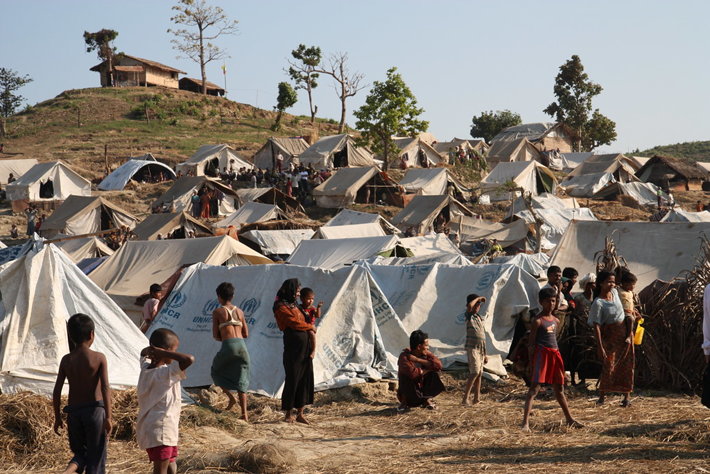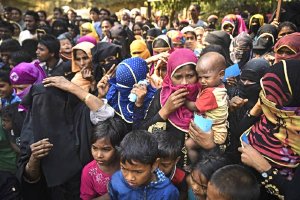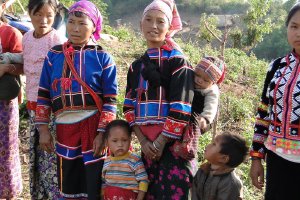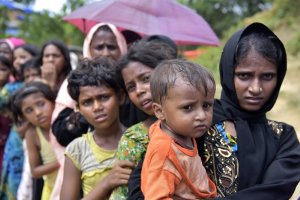A multiethnic humanitarian group that works in some of the world’s most dangerous conflict zones has a simple answer to what drives its efforts: Love.

Called Free Burma Rangers (FBR), the group is primarily active in military-controlled Burma (Myanmar), Iraq and Sudan.
With the cooperation of pro-democracy grassroots groups, the organization trains highly mobile relief teams in emergency medical care, and teaches them to provide food, shelter and clothing and to document human rights violations.
The organization was founded in 1997 by Dave Eubank, a former U.S. Army Ranger and Special Forces officer, during the Burmese Army offensives that year against ethnic minorities in the Southeast Asian nation.
It was a time when “villages were destroyed, people killed and over 100,000 people fled their homes; over 1 million people are still displaced,” according to FBR. “In the face of the overwhelming force by the Burma Army, the Free Burma Rangers was formed with the idea that no one can stop people from giving love and serving one another.”
Eubank is a deeply religious Texan, well known in Burma. According to a May 2021 article in Vice, “Why This Former American Soldier Keeps Returning to War Zones,” he was raised in Thailand by Christian missionary parents, spoke Thai as his first language, and joined the U.S. Army as an infantry officer after graduating from college in Texas.
Eubank met his wife Karen in seminary after he left the military. The devout soldier turned missionary medic told Vice that in 1993 he received an invitation from paramilitary leaders of Wa State, a Burmese autonomous region. The Wa foreign minister, a Christian who knew Eubank’s parents from their days as missionaries in Thailand, asked Eubank if he would consider training the Wa army in Burma.
Last year, a documentary was released about FBR’s activities in the Middle East, Free Burma Rangers: A Family Brings Hope to the Front Lines. In July 2020, Eubank published a memoir, Do This For Love: Free Burma Rangers in the Battle of Mosul. Chris Sorensen, a retired U.S. Army colonel, praised the book as “Humanity at its finest—the ever-benevolent Eubank family and their valiant Free Burma Rangers teach us what service to a higher purpose truly means.”
According to Eubank, since launching, FBR has trained more than 250 multiethnic relief teams. Of these, 71 are currently active fulltime in a dozen regions of Burma where ethnic and Christian minority populations have long suffered deadly persecution at the hands of the Burmese military.
Burma’s military leaders seized power from the democratic government and re-imposed martial law in the nation on February 1, 2021. Since then, the military junta has brutally crushed public protests, killing more than 1,000 people, according to the Assistance Association of Political Prisoners, Reuters reported in August.
“Each step taken to grow the Free Burma Rangers has been at the request of local ethnic leadership,” according to the FBR website. Further, the teams, under the direction of FBR coordinators and local leaders, have carried out more than 800 humanitarian missions lasting four to eight weeks in Burmese war zones. They offer “emergency medical, educational, spiritual, material and general assistance to people.” More than half a million patients have been helped so far, and aid has been given to more than 1.1 million people.
FBR delivers regular reports to supporters, news media, nongovernmental organizations and governments about developments in Burma. On January 2, 2013, for example, the BBC reported, based on video footage provided by FBR to them, that Burmese military attack helicopters had been targeting rebels for five days in the northern Kachin state, home to one of Burma’s largest Christian minority groups.
Besides providing emergency medical relief and keeping the world outside Burma abreast of military atrocities against the nation’s ethnic and religious minorities, FBR also offers leadership development and communications training to beleaguered populations in an effort to strengthen their civil societies. In addition, the organization helps organize annual seminars aimed at developing unity among various ethnic factions and pro-democracy groups in Burma.
FBR’s activities have lately expanded beyond Buddhist-majority Burma to other disaster areas, including Afghanistan, where, Eubank revealed in a September 15 interview, Taliban forces are carrying out mass executions of their enemies.
“Some people say you’re doing this to be a hero,” Eubank told Vice. “But self-preservation trumps image every time. And so when you’re in those situations, where the danger is clear, and the probability of you surviving is not there, you don’t move forward because of pride. But you go forward because of love.”
______________
The Church of Scientology publishes this blog to help create a better understanding of the freedom of religion and belief and provide news on religious freedom and issues affecting this freedom around the world.
The Founder of the Scientology religion is L. Ron Hubbard and Mr. David Miscavige is the religion’s ecclesiastical leader.
For more information, visit the Scientology website or the Scientology TV network.


